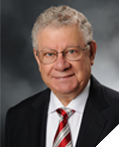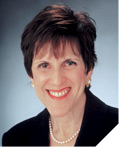Introduction – A Year of Collaboration and Global Partnerships
2012 was a year of great achievement for the American Chemical Society. We achieved success through a robust partnership of ACS members, governance, and staff, often working with other organizations. The 2012 ACS Annual Report highlights several of these accomplishments. ACS carries out so many initiatives that we often forget the incredible diversity of ways that we serve our members and the broader scientific enterprise worldwide.
ACS issued one of the most comprehensive reports in a half century on the fundamental changes needed in the education of scientists in the chemical sciences whose work impacts virtually every scientific discipline. The report was the result of the Commission on Graduate Education in the Chemical Sciences, one of the major initiatives of ACS President Bassam Z. Shakhashiri, Ph.D. Symposia and workshops will be held in 2013 to review and explore ways to implement the recommendations.
Another presidential initiative was the ACS Presidential Working Group on Climate Science. This group developed a web-based tool kit about the science of climate change to be used as a resource by ACS members to discuss this important issue with other scientists, policymakers, educators, and the public.
ACS fostered collaboration among people across geographic boundaries to solve global challenges. We support our members in many ways to help them advance chemistry through research, education and innovation. Communicating chemistry to fellow scientists and to the world is one of ACS’s core functions. The quality and prestige of ACS publications, including 42 journals and Chemical & Engineering News (C&EN) weekly news magazine, are unparalleled. Communicating the value and contributions of the chemical sciences to non-scientists is another important role for ACS and is one of the goals of the ACS Strategic Plan for 2012 and Beyond.
ACS expanded its international collaborations. As a global organization with a sizeable percentage of our members living outside the United States, we see our global presence in terms of helping all members achieve their goals in a global workforce and environment. In December 2012, ACS launched a new International Center, an online clearinghouse of information on international opportunities for chemical practitioners. The site is a one-stop, efficient, and comprehensive resource showcasing existing international collaboration opportunities, experiences, and logistics. This was an outgrowth of a 2010 Presidential Task Force.
The launch of the Chinese Microsite was ground-breaking for ACS in the development of localized ACS websites for international audiences. It was developed based on the needs of our Chinese stakeholders. The site is in Chinese and includes information about ACS programs, products, and services. It represents a global dialogue in science, technology, and chemistry and is especially important in helping to strengthen the connection between ACS and the scientific community in China and the rest of the world.
In 2012, editors of a dozen ACS journals and key ACS Publications staff completed a two-week editorial outreach visit to India, where they met with more than 3,000 scientists and students to discuss emerging trends in chemical science and the publication of scientific research in ACS journals. In recognition of India’s leadership in science, ACS editors visited 13 academic and research institutions spanning seven cities in India: Mumbai, Bangalore, Delhi, Kanpur, Hyderabad, Pune, and Kolkata. The trip to India, while the first for ACS Editors, is part of ACS journals’ growing presence around the world, with other activities taking place in China, Japan, and elsewhere.
Another significant event in 2012 was ACS hosting the 44th International Chemistry Olympiad (IChO) in Washington, D.C. This was the first time that the United States and ACS had hosted the event in 20 years. IChO involved 72 countries, nearly 300 students, and 700 participants. The Dow Chemical Company was the sole financial sponsor ($2.5 million) of the 44th IChO, along with generous donations of facilities and personnel by the University of Maryland at College Park. Other major donors included Sigma Aldrich, which provided the chemicals for the experiments. The U.S. team won one gold medal and three silver medals. U.S. Senator Chris Coons (D-DE) sponsored a Senate resolution recognizing the importance of STEM education and the roles of ACS and the University of Maryland in arranging for the 44th IChO. The Maryland legislature gave citations to Dow, University of Maryland, and ACS honoring them as principals for the event.
The economy was challenging in 2012. ACS continued to help members look for jobs and provide guidance for career development. In addition to leadership training and the enormous existing suite of ACS Career Services designed to help members thrive in the global workforce, ACS launched a model Online Jobs Club program to help displaced workers, especially the long-term unemployed, gain tools, leads, and insights from colleagues on job search and employment issues. These clubs met weekly through web-based communications to discuss common challenges and facilitate training and networking.
To enhance chemistry-related training, innovation, and job creation, ACS developed and launched a new Entrepreneurship Initiative (EI) in 2012, the outgrowth of a 2011 Presidential Task Force. The program received the highest award given by the American Society for Association Executives for programs that make a difference in the world. The EI’s two components—an intensive training program for budding entrepreneurs and a resource center for established entrepreneurs—were both test marketed and fully operational in 2012. In addition, through the generosity of entrepreneur Kathryn (Kitty) Hach-Darrow, a new award established by the ACS Board of Directors was endowed with $500,000 and named the Kathryn C. Hach Award for Entrepreneurial Success. The first award will be given in 2014.
Although the global economy continued to struggle in 2012, we are pleased to announce that ACS ended 2012 with many extraordinary achievements and with a positive financial position. The Board of Directors is pleased to report that for the ninth consecutive year, ACS ended the year with a positive net contribution from operations.
In 2012, ACS settled the long-running legal case, ACS vs. Leadscope to the agreement of all parties.
Looking forward, the Board of Directors will be guided by the ACS Strategic Plan for 2012 and Beyond. The plan has four strategic goals that provide a path to achieve our Vision, Improving people's lives through the transforming power of chemistry.

Bassam Z. Shakhashiri
President

William F. Carroll, Jr.
Chair
Director-At-Large

Madeleine Jacobs
Executive Director
& CEO